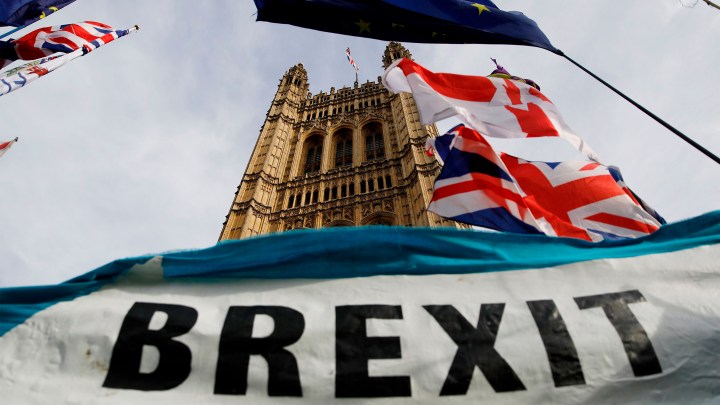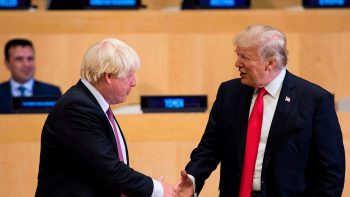
Britain’s general election: a choice between starkly contrasting economic visions
Britain’s general election: a choice between starkly contrasting economic visions

Britain’s general election on Thursday will offer a stark choice between two directions for the UK economy: the leftist ideology of the Labour Party and the pro-business, pro-Brexit policies of the ruling Conservative Party.
Prime Minister Boris Johnson called the election in October because his party had lost its majority in parliament and he couldn’t push through his deal for leaving the EU. Johnson is hoping to secure a solid majority so that he can, to quote his campaign mantra, “Get Brexit done.”

Johnson’s main opponent, Labour Party leader Jeremy Corbyn, anxious to avoid alienating his party’s many anti-Brexit supporters, has taken a different tack in the campaign. Corbyn has called for the most radical overhaul of the British economy since Margaret Thatcher’s free market reforms in the 1980s. He aims to reverse those reforms and expand significantly the size and role of the British state. He plans to re-nationalize water, electricity, rail and mail services; to confiscate 10% of the dividends paid out by large companies; to provide free broadband for everyone in the UK; to institute a four-day work week; to cap and control rents, and more.

“We can rewrite the rules of our economy to work for the many, not the few,” Corbyn told an enthusiastic crowd of supporters when he launched his election manifesto.
“Ignore the wealthy and the powerful who tell you that this isn’t possible. The future is ours to make,” he said.
The manifesto has proved popular with the general public. Labour’s poll ratings picked up, reducing the Conservative Party’s lead. Many young voters, like Londoner Freddie Mason, say that Labour is addressing their concerns.
“The country is in a complete mess. Public services are falling apart,” Mason said. “There’s a huge housing crisis, especially in London where rent is astronomical. The Labour Party is offering sensible alternatives.”

The big election battleground is well away from London. It’s in the Midlands and in the North, in marginal Labour-held but Brexit-supporting, electoral districts.
Conservatives have been campaigning hard in such constituencies to persuade voters that getting Brexit done will free the UK from EU ties so that it can realize its global trading potential. But many voters seem more drawn to Labour’s domestic pledges.
“I must admit I agree with a lot of their policies, or feel that their hearts are in the right place. I think we have to be more socially aware nowadays,” said Liz Reed in the West Midlands constituency of Stoke-on-Trent North.
Conservative politician councillor Daniel Jellyman told “Marketplace” that people had either forgotten or were not aware how badly Britain’s state-run companies performed in the 1960s and 70s.
“You think you can hold a utility to account because it’s run by a civil servant or a politician. But that wasn’t the case in Britain before Margaret Thatcher’s privatizations. Those state-run utilities were very badly managed,” he said.

Jellyman thinks that support for the Labour manifesto reflects a decline in enthusiasm in Britain for the capitalist system.
“Since the financial crisis and the recession we’ve seen the negative side of capitalism. There hasn’t been a strong enough argument in favor of the benefits of capitalism: freedom and prosperity,” he said.
In its manifesto, Labour has emphasized the beneficence of the state: in addition to free super fast broadband for all, it’s offering free university tuition and free dentistry. All to be paid for by extra taxes on big companies and the rich. Jonathan Gullis, a Conservative candidate for Stoke North, is not impressed.

“Corbyn says he’ll only be taxing the top 5%. But they and the big companies will simply move their money or go abroad,” he said.
Battered by austerity, maddened by Brexit, infuriated by sky-high house prices, many Brits may indeed have fallen out of love with capitalism. But, according to Gullis, any love affair with Corbynism will end in tears.
“Jobs will go, the economy will shrink and we’ll find out just how dangerous Corbynism is,” he said.
Thursday’s election may well come down to this: a vote for Brexit, or a vote for a seismic leftward shift in the British economy.
There’s a lot happening in the world. Through it all, Marketplace is here for you.
You rely on Marketplace to break down the world’s events and tell you how it affects you in a fact-based, approachable way. We rely on your financial support to keep making that possible.
Your donation today powers the independent journalism that you rely on. For just $5/month, you can help sustain Marketplace so we can keep reporting on the things that matter to you.


















